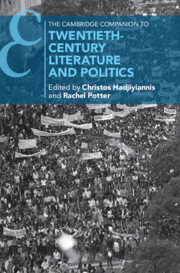Book contents
- The Cambridge Companion to Twentieth-Century Literature and Politics
- The Cambridge Companion to Twentieth-Century Literature and Politics
- Copyright page
- Contents
- Figures
- Notes on the Contributors
- Acknowledgements
- Chronology
- Introduction Literature and Politics
- Part I 1900–1945: Ideas and Governance
- Part II 1945–1989: New Nations and New Frontiers
- Chapter 6 Partitions
- Chapter 7 Federalism
- Chapter 8 Cold War
- Chapter 9 Irish Nationalism
- Chapter 10 Black Nationalism
- Chapter 11 Caribbean Nationalisms
- Chapter 12 African Nationalisms
- Chapter 13 Apartheid
- Part III 1989–2000: Rights and Activisms
- Further Reading
- Index
- Cambridge Companions To …
Chapter 13 - Apartheid
from Part II - 1945–1989: New Nations and New Frontiers
Published online by Cambridge University Press: 01 December 2022
- The Cambridge Companion to Twentieth-Century Literature and Politics
- The Cambridge Companion to Twentieth-Century Literature and Politics
- Copyright page
- Contents
- Figures
- Notes on the Contributors
- Acknowledgements
- Chronology
- Introduction Literature and Politics
- Part I 1900–1945: Ideas and Governance
- Part II 1945–1989: New Nations and New Frontiers
- Chapter 6 Partitions
- Chapter 7 Federalism
- Chapter 8 Cold War
- Chapter 9 Irish Nationalism
- Chapter 10 Black Nationalism
- Chapter 11 Caribbean Nationalisms
- Chapter 12 African Nationalisms
- Chapter 13 Apartheid
- Part III 1989–2000: Rights and Activisms
- Further Reading
- Index
- Cambridge Companions To …
Summary
This chapter explores the multiple imbrications of literature and politics in the context of apartheid South Africa. It considers the literary-critical debates and interventions that underpinned and connected them and offers a reading of cultural-political resistance through the lens of periodical print culture and the lively publics they convened. It addresses a wide range of critical-cultural interventions from the late 1940s until the early 1980s and identifies the continuities and shifts that mark this tradition and points to some of the historical changes that have shaped it. What emerges is a long and vigorous history of dissonant cultural debate and an understanding of the central role it played in informing the aesthetic and political priorities of the writers of the day. The chapter asserts that political struggles in South Africa were frequently articulated in cultural terms and that forms of political critique often took shape as arguments about literature and the reading of texts. What this recognition demands, it argues, is an amplified understanding of the history of political struggle as played out, in part, in aesthetic-cultural terms.
Keywords
- Type
- Chapter
- Information
- Publisher: Cambridge University PressPrint publication year: 2022

